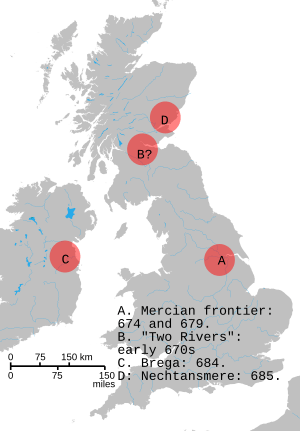Ecgfrith of Northumbria facts for kids
Ecgfrith (also spelled Egfrith) was a powerful king who ruled Northumbria, an important kingdom in early England. He was born around 646 AD and became King of Deira in 664. Later, he became the King of all Northumbria in 670, after his father died. During his time as king, Northumbria was very strong and influential. His rule ended in 685 when he was defeated and killed in a big battle called the Battle of Nechtansmere.
Contents
Early Life of King Ecgfrith
Ecgfrith was a younger son of King Oswiu of Northumbria and Queen Enfleda. His mother, Enfleda, was the daughter of King Edwin of Northumbria. When Ecgfrith was about ten years old, in 655, Penda of Mercia took him as a hostage.
In 660, when he was about fifteen, Ecgfrith married Etheldreda. She was the daughter of King Anna of East Anglia. Etheldreda had been married before, but she chose to live a life dedicated to God. Bishop Wilfrid supported her choice. This caused some disagreements between Ecgfrith and Bishop Wilfrid.
Ecgfrith Becomes King
In 670, shortly after his father died, Ecgfrith became the King of Northumbria. Ecgfrith wanted an heir for the kingdom. He asked Bishop Wilfrid to talk to Queen Etheldreda about this. Ecgfrith even offered the bishop gold and land. However, Etheldreda did not change her mind.
The marriage was ended before 672. Etheldreda was allowed to become a nun. She first went to Coldingham Priory. A year later, she became the leader of a monastery she had built herself in Ely. Ecgfrith then married his second wife, Eormenburg. Queen Eormenburg and Bishop Wilfrid did not get along well.
Important Battles and Peace Treaties
In 672, the Picts (people living in what is now Scotland) rebelled. They removed the king that Northumbria had put in charge there. Ecgfrith sent his army to Pictland to punish them. He defeated the Picts and put his leader, Beornheth, in charge.
In 674, Wulfhere of Mercia and his friends attacked Northumbria. Wulfhere wanted to take back the land of Lindsey. But Ecgfrith defeated Wulfhere. He made Wulfhere pay a special tax called a tribute.
Wulfhere's brother, Aethelred, became King of Mercia in 675. Ecgfrith arranged for his sister, Osthryth, to marry Aethelred. However, in 679, Aethelred defeated Ecgfrith in a battle near the River Trent. To stop a long-lasting conflict between the two royal families, Theodore, the Archbishop of Canterbury, stepped in. He helped create a peace agreement between Northumbria and Mercia. This peace lasted for 50 years.
Ecgfrith then focused on the Britons of Rheged. He forced them out of northern England and into Ireland. There, they became soldiers for hire for the Irish kings. They also started raiding the English coast.
In 684, Ecgfrith led his armies against the kingdom of Brega, which was north of modern-day Dublin in Ireland. He won this battle and returned to Northumbria. After this victory, he might have become too confident.
The Final Battle
In 685, Ecgfrith attacked the Picts again. This time, he was defeated and killed. On May 20, 685, his forces were tricked into a surprise attack at Nechtansmere, near Forfar in Scotland. Ecgfrith and his second wife, Eormenburg, did not have any children. After Ecgfrith's death, his half-brother, Aldfrith, became king. Queen Eormenburg later went to Carlisle Abbey.
Ecgfrith and the Church
Ecgfrith was a supporter of the Church. In 674, he gave Benedict Biscop, a Northumbrian nobleman, fifty hides of land. A hide was a measure of land. This land was at the mouth of the River Wear. It was used to build the first of two large monasteries.
In 682, King Ecgfrith gave another forty hides of land to Benedict. This was for a second monastery at the mouth of the River Trent at Jarrow. These two monasteries were run as one group. They became known as Monkwearmouth-Jarrow Abbeys. These abbeys became important centers of learning. This is where Bede, a famous historian, wrote most of his works. Ecgfrith was at the opening of Jarrow Abbey in 685, about a month before he died.
From 669, Bishop Wilfrid was very involved in all the gifts of land and money given to the Church by the Northumbrian king and queens. He became very powerful and wealthy. In 671, he started building a large church. It was paid for by the king and by lands taken from British churches.
However, after Queen Etheldreda became a nun, Bishop Wilfrid lost much of his support from the royal family. The new queen, Eormenburg, did not like Wilfrid. Stephen of Ripon, who wrote a book about Wilfrid, said that Eormenburg was jealous and did not respect the bishop. In 678, King Ecgfrith forced Bishop Wilfrid to leave Northumbria. Bede, another historian, did not explain why Wilfrid was sent away, but he clearly supported the Bishop.
See also
 In Spanish: Egfrido de Northumbria para niños
In Spanish: Egfrido de Northumbria para niños
 | Shirley Ann Jackson |
 | Garett Morgan |
 | J. Ernest Wilkins Jr. |
 | Elijah McCoy |


